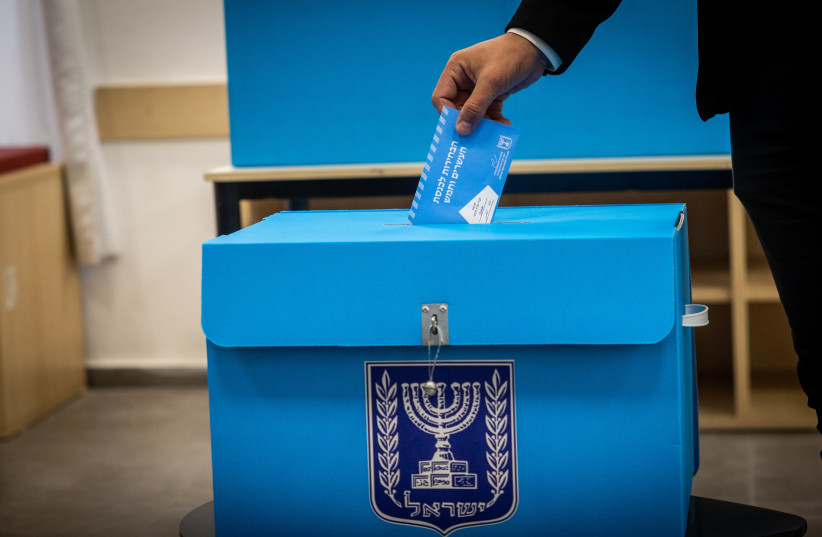In my last article, I mentioned several issues that ought to be decided in early elections.
I did not state that early elections will, in fact, take place, nor did I state that all the issues I mentioned, and many others I did not, are issues that will determine whether Israel will remain a liberal democracy or turn into an illiberal democracy, or (heaven forbid) an authoritarian state.
I believe that though a government enjoys the full support of a majority of citizens of the state, as reflected in the makeup of the Knesset, it may tamper with the type of regime we have, as suggested recently by Communications Minister Shlomo Karhi.
The fact is that the current makeup of Knesset does not accurately reflect the current makeup of public opinion.
True, according to Israel’s unwritten constitution, as outlined in its basic laws, a government can continue to serve as long as a majority of the MKs support it.

However, according to all the polls, if early elections were held today, the makeup of the Knesset would change significantly and the number of Knesset seats held by the current coalition members would fall from 68 to 49-52.
If these were normal times, this situation would be tolerable. But these are not normal times. We are in a state of war, conducted by a government that no longer has the support of a majority of the citizens on numerous issues.
In addition, 18 of the coalition’s 68 MKs – members of the haredi (ultra-Orthodox) parties – are actively seeking to be unconditionally exempted from military service.
Another 11 MKs are members of two coalition parties – the Religious Zionist Party and New Hope-United Right – which, according to all the polls, will fail to pass the 3.25% qualifying threshold in the election for the 26th Knesset.
Common sense says that such a government cannot change the state’s regime by weakening its judicial system; privatizing the public media and disempowering those elements of the media that are more critical of the government; and trying to disqualify various representatives of the Arab citizens of Israel, as the current government seems determined to do.
By the time the next elections are held in October or November of 2026, the chances of the current opposition winning the elections will be greatly reduced.
Pessimists in the opposition today even believe there is a possibility that elections might be put off indefinitely.
What is the argument against elections?
THE MAIN formal argument against holding early elections today is that we are in the middle of a war, and all efforts should be placed on winning the war – not on political battles.
Unfortunately, it is not at all certain the government wants to end the war as quickly as possible; instead, it may be trying to gain time for various undeclared purposes, which allegedly include keeping the current coalition intact.
A case in point is the sudden, rapidly attained ceasefire agreement regarding the fighting in the North – which is certainly not an agreement with Hezbollah, with whom we have been battling directly for the last 14 months, nor with the Lebanese government, which is a weak and ineffective body that would be happy to end the fighting but has no control over the goals and activities of Hezbollah.
Did our government sign this agreement, with the US as a mediator, in order to end the fighting, or to prove that Hezbollah is untrustworthy and that the fighting must go on?
Perhaps Prime Minister Benjamin Netanyahu wanted to give President Joe Biden some semblance of a diplomatic achievement before he departs.
But one doesn’t have to be a great military expert to understand that this agreement does not enable the immediate, safe return of our northern population to their homes.
There appears to be no systematic plan that will keep Hezbollah as far as possible from southern Lebanon and the Israel-Lebanon border. Nothing is said about a buffer zone and the mechanism for ensuring the agreement is kept by Hezbollah.
WHAT NETANYAHU really wants with regard to the Gaza Strip is also a well-kept secret.
Does he want to defeat Hamas both militarily and as a governing force, and enable a new, non-Hamas Palestinian reality to develop in the Gaza Strip, under Israeli military rule, if necessary?
Or does he want to encourage Jewish settlement, driven by messianic expectations, all over Gaza, and encourage the emigration of Palestinian Gazans by making their lives even more intolerable than they are today?
Furthermore, the release of the remaining 101 hostages appears to be a vague issue with Netanyahu, though perhaps the fact that president-elect Donald Trump is reported to want the hostage issue resolved by the time he resumes office on January 20 will have a practical effect on Netanyahu.
If we have early elections, all these issues will have to be addressed by both Netanyahu and the opposition parties. Voters will, at long last, be able to replace speculations and incertitudes with concrete propositions.
Other issues, more or less urgent, will also have to be clarified, such as the rights and duties of the haredim in the State of Israel, the rights and duties of Israel’s Arab citizens, whether Israel needs public TV and radio broadcasts, and possible compromises on the makeup of the Supreme Court, as between conservatives and liberals, and more varied communal groups.
I am pessimistic whether early elections will actually take place. Netanyahu and his coalition partners realize the opinion polls are not favorable to them.
Though they might publicly pooh-pooh the polls’ findings, in reality, they take them very seriously. Early elections will only be held if the coalition falls apart of its own volition.
The writer worked in the Knesset for many years as a researcher and has published extensively both journalistic and academic articles on current affairs and Israeli politics. Her most recent book, Israel’s Knesset Members: A Comparative Study of an Undefined Job, was published by Routledge.
